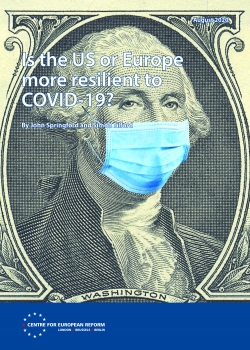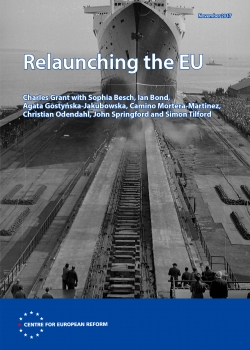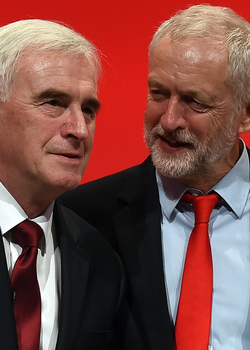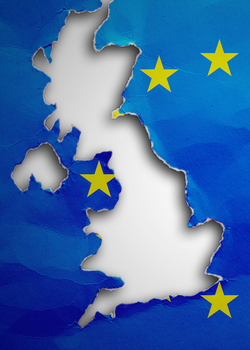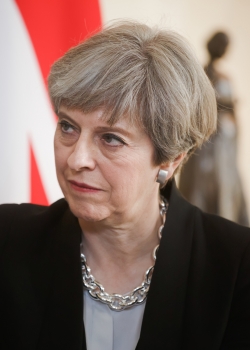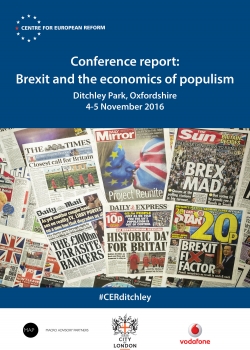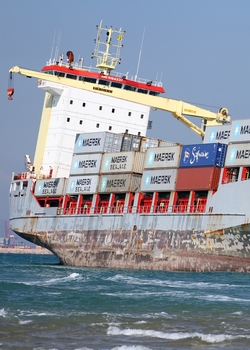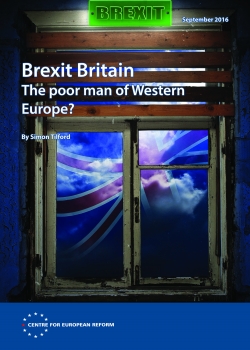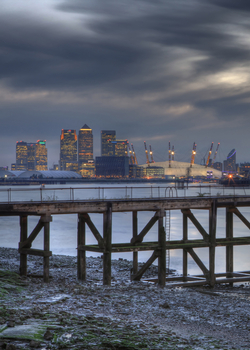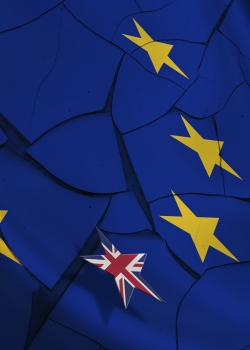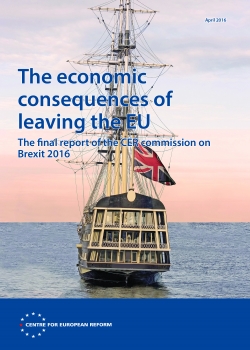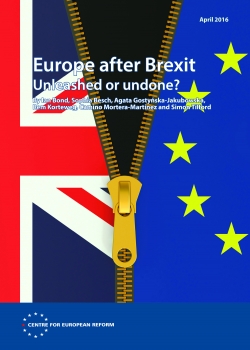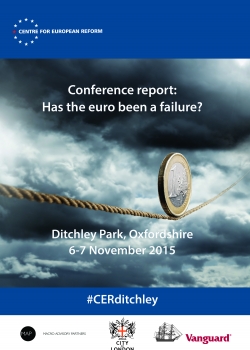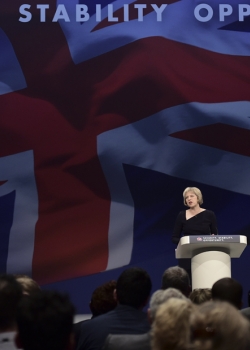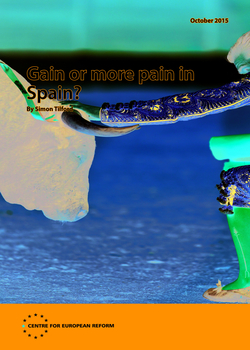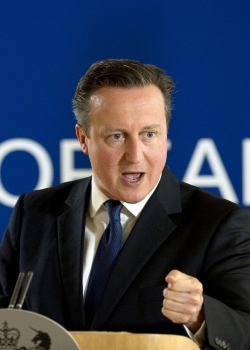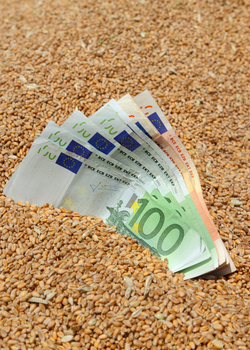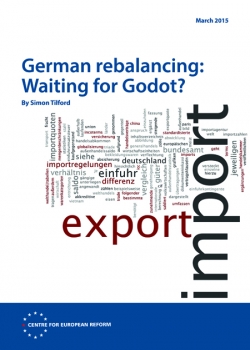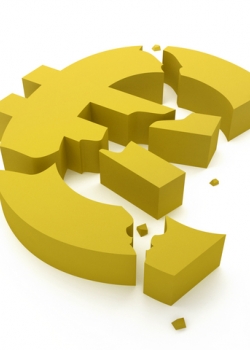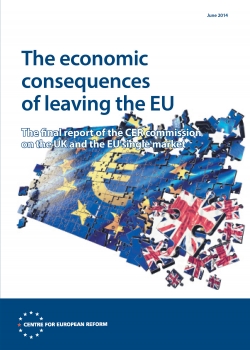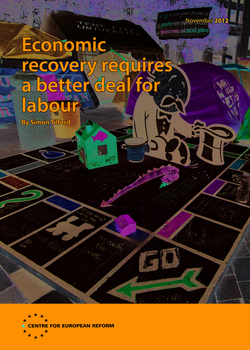Simon Tilford
Simon Tilford

Associate fellow
Areas of expertise
Britain and Europe, the euro, fiscal and monetary policy, labour and social policy, competition, innovation, environmental economics and demographics.
Twitter
Is the US or Europe more resilient to COVID-19?
04 August 2020
COVID-19 has exposed the lack of risk-sharing between US citizens. But Europeans should not be complacent: a permanent and more automatic fiscal union may be needed to secure 'the European way of life'.
Conference report: How to save the EU
15 January 2018
50 leading economists, political scientists and experts on the EU considered the forces undermining the Union, and how Europe should respond to them.
All is not well in the Visegrad economies
29 November 2017
On the face of it the Visegrad – the Czech Republic, Hungary, Poland and Slovakia – appear to be doing quite well economically. But there are problems behind the headline growth figures.
Relaunching the EU
07 November 2017
The EU is ripe for fundamental reform. New policies are needed for migration and the euro. The EU also needs more flexible structures so that countries can opt in and out of key policies.
The limits to Labour's 'constructive ambiguity' over Brexit
06 July 2017
Labour proposes a "jobs-first" and hard Brexit at the same time. This means the party can't capitalise on the Tories' stewardship of the economy.
How should the EU react to Britain's general election?
15 June 2017
The EU-27 can force Britain's politicians to acknowledge Brexit’s trade-offs, by offering the British four options from which it must choose.
What does the election result mean for Brexit?
09 June 2017
Brexit barely figured in the UK's general election, but the result means that the country might yet have an election fought explicitly on the issue.
Why no deal would be much worse than a bad deal
24 May 2017
Theresa May and several of her ministers have claimed that no Brexit deal would be better than a poor deal. They are wrong.
The British and their exceptionalism
03 May 2017
Few countries have allowed their sense of exceptionalism to damage their interests in the way Britain is doing. British overconfidence is unjustified and will come at a heavy price.
Is the EU's single market leading to convergence or divergence?
04 April 2017
The single market's 'agglomeration effects' – the tendency of wealthier areas to attract capital and skills – seem as strong as the 'catch-up effects' of poorer members importing capital and expertise.
Crisis of capitalism? Perhaps, but don't blame it on globalisation
10 February 2017
Globalisation did not force governments to adopt policies that divided their countries, exacerbated inequality and hit social mobility. Many of them did those things by choice.
Britain's economy: Enjoy the calm before the storm
26 January 2017
Britain's economy has not weathered the Brexit storm. But the calm before the storm has lasted longer than many economists expected.
Brexit blow: UK's top EU diplomat quits as Article 50 deadline looms
International Business Times
03 January 2017
Simon Tilford, deputy director of the Centre for European Reform, spoke to IBTimes UK about Rogers' resignation.
Brexit and the economics of populism
12 December 2016
Inequality, insecurity and a nativist backlash against immigration all help to explain the rise of populism. But globalisation does not prevent governments from addressing these problems.
A wake-up call for liberal Brexiters
22 November 2016
Trump's win has further weakened the liberal case for Brexit. Forging the closest EU ties possible is now even more essential for Britain.
Sterling slump won't rescue the British economy
21 October 2016
The 2008 devaluation did not prompt strong growth in British exports. The post-referendum fall in the pound is unlikely to do so either.
Brexit Britain: The poor man of Western Europe?
23 September 2016
Britain's economic record is mediocre and much of the country poor by Western European standards. The reasons for this are home-grown. And Brexit risks aggravating them.
Brexit will make Britain's mediocre economic record worse
19 September 2016
Britain is already an average economic performer by Western European standards. Brexit will further sap its economic dynamism and aggravate startling regional disparities
CER podcast: Simon Tilford and Alexander Stubb on Brexit and the future of Britain and the EU
16 September 2016
Simon Tilford speaks to former Prime Minister of Finland Alexander Stubb about the implications of Brexit and the challenges ahead for the EU.
Judy Asks: Is Brexit reversible?
Carnegie Europe
29 June 2016
A selection of experts answer a new question from Judy Dempsey on the foreign and security policy challenges shaping Europe’s role in the world.
Dear EU leaders, please handle Britain with care
29 June 2016
Britain is in serious trouble. It does not need further concessions from you, but the dust needs to settle before it can take decisions about its future.
There is legitimate anger at the EU, and then there is populism and nationalism
22 June 2016
Some frustration with the EU is justified, but much of it – particularly in the UK and across Central and Eastern Europe – reflects populism and nationalism.
The economic consequences of leaving the EU: The final report of the CER commission on Brexit 2016
21 April 2016
After leaving the EU, the UK would face an invidious choice: sign up to EU rules and the free movement of labour, or suffer economic damage.
Europe after Brexit: Unleashed or undone?
15 April 2016
If Britain left the EU, the character of the Union would change. The UK has driven economic liberalisation and foreign policy co-operation, and has made the EU's machinery more efficient.
The ideologues within
19 May 2016
Brexit will be a vote for less openness to trade, people and foreign culture, and a victory for ‘common sense’ and gut feeling over evidence.
Time for a regime change in Frankfurt
08 March 2016
To get eurozone inflation back to the 'close to 2 per cent' target, the ECB needs to be much bolder – and needs fiscal help.
How to make EU emissions trading a success
EurActiv.com
14 February 2016
The emissions trading scheme currently in place in the EU has “fundamental flaws”, writes Simon Tilford, chief economist at the Centre for European Reform (CER).
Can the eurozone shake off the global gloom?
22 January 2016
The global economy has shifted from being the potential saviour of the eurozone economy to an additional source of uncertainty for it.
Has the euro been a failure?
11 January 2016
The euro has not been a positive economic and political force. But keeping the single currency together could still be less risky than dismantling it.
Britain, immigration and Brexit
30 November 2015
If the UK quits the EU, it will be because British politicians have pandered to anti-immigrant sentiment rather than addressing the supply-side failures that drive it.
Gain or more pain in Spain?
19 October 2015
Spain is no poster child for austerity and structural reforms. The recovery is less than it appears and the country faces some formidable challenges.
Q: With Europe at the top of the Tory party conference agenda, is Cameron's EU renegotiation doomed to fail?
City A.M
05 October 2015
Simon Tilford is deputy director of the Centre for European Reform, says No.
Will the eurozone reap what it has sown?
24 September 2015
The slowdown in emerging markets leaves the eurozone even more reliant on exports to the US and UK to compensate for its feeble domestic economy.
How will the eurozone cope with the next downturn?
27 May 2015
Eurozone policy-makers will have little ammunition to combat the next downturn: interest rates will still be close to zero, public debt and unemployment high.
German rebalancing: Waiting for Godot?
09 March 2015
Far from rebalancing, Germany’s trade surplus continues to grow. This is in nobody’s interests. The German government could and should take steps to reduce it.
Does a eurozone slump make Brexit more likely?
10 November 2014
Eurozone stagnation will encourage migration to Britain, boost its EU budget contributions, and rebalance its trade towards non-EU markets. This will embolden eurosceptics.
The eurozone’s fault lines
The New York Times
14 July 2015
Without crucial reforms, the currency union is likely to remain in a political no man's land, whatever happens to Greece.
The economic consequences of leaving the EU
09 June 2014
A group of experts finds that, after leaving the EU, the UK would face an invidious choice: sign up to the single market’s rules, or suffer economic damage.In April 2016 an updated version of the report The economic consequences of leaving the EU: The final report of the CER commission on Brexit 2016 was published.
The eurozone’s German problem
20 October 2014
Germany’s uncompromising stance is short-sighted, and poses a greater risk to its economic and political interests than a ‘grand bargain’ with the French and Italians.
Economic recovery requires a better deal for labour
05 November 2012
Unless labour receives a larger share of the pie, Europe's economic recovery will prove elusive and popular hostility to markets will grow.

